Directions / Warnings
DIRECTIONS: Mix one Stick Pack in 16 ounces of water.
ALLERGENS: Tree Nut (Coconut). Manufactured in a facility which processes Milk, Eggs, Fish, Shellfish, Tree Nuts, Peanuts, Wheat, Soybeans, and Sesame. This product is only intended to be consumed by healthy adults 18 years of age or older. Pregnant or nursing women should not use this product. Before using this product, consult with your physician, especially if you are taking any prescription, over the counter medication, dietary supplement or if you have any pre-existing medical condition including but not limited to: high or low blood pressure, cardiac arrhythmia, stroke, heart, liver, kidney or thyroid disease, seizure disorder, psychiatric disease, diabetes, difficulty urinating due to prostate enlargement or if you are taking a MAOI (Monoamine Oxidase inhibitor) or any other medication. Discontinue use and consult your Healthcare Professional if you experience adverse reaction to this product. Discontinue use 2 weeks prior to surgery. Do not exceed recommended serving. Do not use if safety seal is broken or missing. Keep out of reach of children.
Science
Vitamin C (as ascorbic acid)
Vitamin C is perhaps historically best-known for the treatment and prevention of scurvy, though it has many other roles in the body. For example, vitamin C catalyzes or is a cofactor in eight enzymatic reactions involved in the synthesis of collagen, the nutrient carnitine, and several neurotransmitters necessary for the proper function of the brain.
In the contemporary context, vitamin C is best known as a potent antioxidant. In addition to its intrinsic activity as an antioxidant, vitamin C has been shown in in vitro trials to regenerate alpha-tocopherol (vitamin E). As an antioxidant, vitamin C combats the detrimental effects of a group of compounds called radical oxygen species that, when produced, degrade the lipid membrane of the cell and may cause internal damage. By “scavenging” these free radicals, vitamin C and other antioxidants form a defense against excess cellular damage.
Calcium (as calcium carbonate, calcium citrate, dicalcium malate (DimaCal®))
While best-known as the main bioactive in milk, and a compound that contributes to strong bones, calcium has numerous physiological effects in the body. As a key electrolyte it is responsible for mediating vascular contraction and vasodilatation, muscle function, nerve transmission, intracellular signaling, and hormonal secretion. Homeostatic regulation of calcium, which the body cannot produce, also requires sufficient levels of vitamin D. In the context of muscular contraction and relaxation, if calcium is required for strong contractions, magnesium is required for efficient relaxation of those muscle fibers.
DimaCal® is a trademarked form of dicalcium malate, which is calcium bonded with malic acid. It has been shown in studies to be a much better absorbed form of calcium and has the ability to maintain serum calcium levels for a much longer period of time. This can lead to a better maintained electrolyte level and greater performance where calcium is required.
Magnesium (as magnesium carbonate, magnesium bisglycinate chelate (TRAACS®), magnesium citrate, magnesium glycinate glutamine chelate (TRAACS®))
Magnesium, an often-overlooked electrolyte, is the second most abundant intracellular cation (after potassium). It is a cofactor to over 300 enzymatic reactions in the body and is required for cellular energy metabolism, functioning of the sodium/potassium adenosine triphosphatase pump, nerve conduction, and ion transport. Magnesium is also required for the use of the body’s energy currency, ATP. To become biologically active, ATP must be bound to magnesium to form Mg-ATP. In addition, magnesium is necessary for the proper function of cells with calcium and potassium gated ion channels such as heart and muscle cells. Working alongside calcium, magnesium plays a crucial role in the body by regulating muscular contractions as well as cramp prevention. In the context of muscle health and rehydration, the longer and more intense a bout of physical activity is, the more magnesium is lost primarily through sweat and urine. This loss of electrolyte balance requires its replenishment so that physical performance can remain at its peak throughout the duration of the activity reducing the risk of injury or bodily harm. Regardless of the type of sport or exercise, muscular contractions and energy production could not occur consistently without the presence of magnesium.
Zinc (as zinc bisglycinate chelate (TRAACS®))
As an essential mineral, like magnesium, zinc is also involved in a wide-range of essential biological functions in the human body – and a requirement in the catalytic activity of over 100 enzymes.
Most notably, zinc is vital for immune function, protein synthesis, cellular division, and DNA synthesis. For immune function, zinc is required for the function of a group of immune cells known as neutrophils and macrophages, which eliminate pathological cells and their products from the body.
With magnesium, sufficient levels of zinc are also necessary for the production and maintenance of healthy levels of testosterone.
Chloride (as sodium chloride, potassium chloride)
Chloride is one of the most important electrolytes in the human body. Similar to sodium and potassium, which will be discussed below, chloride creates specific channels in cell membranes which help to carry out different vital tasks. It is responsible for balancing the fluids on the inside of the cells with the fluids on the outside of the cells, as well as maintaining proper blood volume, blood pressure, and fluid pH. Chloride is also important for muscle and heart contraction as well as to aid in the carrying of nerve impulses between our nerve cells and our brain and the rest of the body. Additionally, chloride is needed to help red blood cells exchange oxygen and carbon dioxide in the lungs as well as plays a role in the digestion of foods by supporting hydrochloric acid production in the stomach. We often lose chloride through sweat and perspiration, which comes in the form of water and salt. Replenishment of chloride can come from utilizing salt (often found as sodium-chloride, or table salt), cheese, canned fish, and some processed meats. Overconsumption of some of these foods may not be beneficial for some individuals, so supplementation may be the best way for these individuals to replenish chloride in their bodies.
Sodium (as sodium chloride, sodium citrate, sodium bicarbonate)
Sodium, like chloride above, is one of the most essential electrolytes for our body to utilize. As sodium is often found bound to chloride as sodium-chloride (salt), their function and benefits are going to be very similar in nature. Sodium helps to keep the water (mainly amount of fluid outside of the body’s cells) and electrolyte balance of the body, while also aiding in the contraction and relaxation of muscles as well as conducting nerve impulses. While only 500mg of sodium is needed per day for these functions to occur, we as active individuals need far more sodium in order to maintain these functions. We mostly lose sodium through sweat and urine, so the more active we are/the more we sweat and the more we urinate, the more sodium is lost. Acquiring enough sodium through food and drink is crucial to establishing equilibrium again in order to maintain proper functioning and electrolyte balance within the body. The standard American diet is often overloaded with sodium and coupled with inactivity, which can lead to poor health and dysfunction. It is important to engage in physical activity of some kind most days and to eat a diet that is balanced in nutrients in order to maintain proper health.
Potassium (as potassium citrate, coconut water concentrate, potassium chloride, potassium glycinate chelate (TRAACS®))
Potassium, as sodium’s counterpart, acts as a critical electrolyte primarily by helping to maintain normal levels of fluids inside of our cells. Additionally, it helps muscles to contract and relax, aid in strong nerve function, as well as support normal blood pressure. It works very closely with sodium to create the membrane potential needed for the electrical currents that generate these functions to pass from one cell to the next. While the potassium levels in our body are regulated carefully, a diet lacking sufficient amounts of potassium (especially when combined with excess sodium) or one that contains too much potassium can eventually lead to certain types of dysfunctions and poor health status. When potassium levels in the body increase, the adrenal glands release the hormone aldosterone, which causes the kidneys to excrete excess potassium through the urine. When potassium levels are too low, aldosterone levels are suppressed, which can lead to conservation of potassium thus interfering with balance and negatively affecting transport channels that affect vital bodily functions. Potassium can be gotten from the diet in the form of fresh fruits and vegetables, such as sweet potatoes, beans, tomatoes, spinach and broccoli but supplementing can be an essential application as well to support an active lifestyle where excretion is higher than can be replenished through diet.
L-Taurine
Through traditionally referred to as an amino acid due to its chemical structure, taurine is not an amino acid in the sense that leucine, alanine, or glutamine are. Its chemical status aside, taurine is considered one of the body’s most essential chemical compounds, as cardiovascular function, muscle development and function, along with optical and nervous systems in the body depend on its abundance. While data on taurine typically occurs with taurine in supplement combinations (with caffeine and other amino acids), these data nevertheless suggest that dietary supplementation with taurine may have beneficial effects on mental focus and alertness and may assist during times of increased physical exertion.
Coconut Water Concentrate (Cocos nucifera)
Coconut water, like the name implies, is the liquid that is found within the coconut itself. Often having a slightly sweet, nutty flavor, it also contains an adequate amount of vitamins, minerals, and electrolytes like potassium, sodium, and magnesium. All of these electrolytes, like discussed in sections above, can help to boost hydration status and replenish nutrients lost through exercise or rigorous everyday activities. Potassium is the highest concentration in coconut water at roughly 600mg per cup (16% DV), which as discussed about it has a vital role in optimally functioning kidneys and strong muscle contractions. Potassium can also work to keep fluid levels and other electrolytes balanced during exercise. The high concentration of potassium in coconut water specifically can balance our sodium’s effects on blood pressure, and even lower blood pressure slightly, which can have its own benefits towards training and overall health and circulatory health. In addition to the added electrolytes that coconut water can provide, it also can provide a potent amount of antioxidants that can aid in the neutralization of free radicals that can rapidly take over during intense training. By eliminating these free radicals, muscles will be able to perform longer and more efficiently, as well as be able to recover adequately. While general water consumption can be adequate as well, the added electrolytes coconut water can supply provides an added benefit that can improve performance and overall recovery.
ElevATP® (Ancient Peat and Apple Extract)
Adenosine triphosphate and other ATP metabolites are involved in a number of biological processes including cardiac function, blood flow, muscle contraction and neurotransmission. ATP is the primary molecule that acts as a carrier for energy within cells. It has also often been studied those increased levels of ATP have shown increases in health and performance. Supplementation with exogenous ATP has often shown its ability to increase ATP concentrations in blood. Oral supplementation with ancient peat and apple extracts have exhibited their ability to increase intracellular and intramuscular ATP levels. ElevATP® is a blend these specific polyphenols that can work to increase endogenous ATP levels without a simultaneous increase in serum lactate. The significance of this is that usually with an increase in endogenous ATP there is an increase in intracellular free radicals. When these free radicals are not present, oxidative stress is mitigated and there is more potential for the beneficial increases in ATP to take center stage. These increases of ATP are essential as when available energy is increased it can have positive benefits in terms of increased power, strength, and overall exercise performance. One study in particular looked at dosing ElevATP® against placebo and showed that the group who received ElevATP® saw a blood ATP increase of 45% on average along with no increase in oxidative blood glucose. This type of result has been shown repeatedly in studies and has given ElevATP® the reputation to be a beneficial compound for the goals of improving endurance, strength, power, and other training specific adaptations.
ConcenTrace® AC (Trace Mineral Complex)
Our bodies are high functioning machines and require a lot of support to continue to perform at a high-level day in and day out. A lot of these needs are difficult to be acquired by diet alone, so supplementation is critical. Minerals are included in these daily needs and are vital to the bodies many processes. ConcenTrace® AC is a high-quality trace mineral complex providing a comprehensive blend of nutrients that are often hard to acquire from diet alone. Its manufacturing process makes it up to 26x more concentrated than other colloidal trace minerals, adding to its benefits. These minerals contained in the product are catalysts for all of the vitamins and other nutrients our body requires to function at an optimal level and maintain health. Some of these functions include electrolyte replacement, maintaining pH balance in the body, nourishing hair and skin, strengthening bones and joints, regulating the digestive system, and improving athletic performance.
Senactiv® (Panax notoginseng (root) and Rosa roxburghii (fruit)) Extracts
Senactiv®, derived from extracts of Panax notoginseng and Rosa roxburghii, has been shown to act in a few pathways to reenergize and rejuvenate cells within the body that take a beating on a daily basis. Ultimately this product falls within a category known as senolytics, or compounds that primarily work to induce cell death. This may not sound ideal as we need our cells to function, but the key is to ensure that these compounds are working on the right kinds of cells.
The human body does contain many senescent cells, which are old cells and can be deteriorating. How these senolytics work to promote health is by speeding up the breakdown of these older cells as well as encouraging the grow of new, vibrant cells. The other benefit of Senactiv® and its ingredients is its ability to protect against muscle damage. Ginseng in particular has been shown to help reduce the proinflammatory state that is associated with rigorous training. Where this is going to benefit is to reduce inflammation and jumpstart the recovery process of torn down muscle fibers so these cells can begin to scar and grow stronger. The other benefit that ginseng has been able to show is it has been shown to improve VO2 mas by about 20% when compared to a control group in studies. This improvement can significantly improve oxygen uptake to increase delivery to muscle cells for the ability to push harder and longer.
On another angle of recovery, Senactiv® has been shown to improve the rate of glycogen storage after exercise. When glycogen can be stored efficiently post exercise it has the ability to attenuate the structural damage associated with training by allowing those carbohydrates and sugars going towards recovery.
Senactiv® is a unique blend of ingredients but with sound research and application behind but with its benefits towards improved cell regeneration, VO2 max, and recovery, it is a great addition to this hydration product.
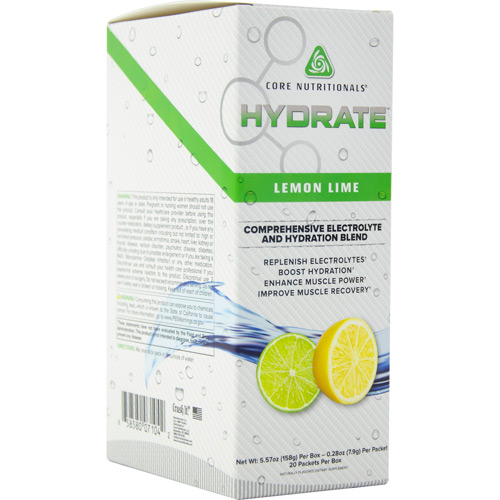
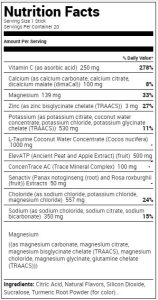
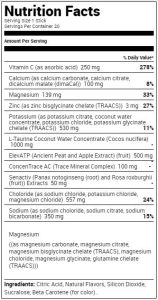
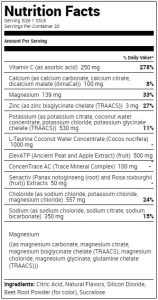
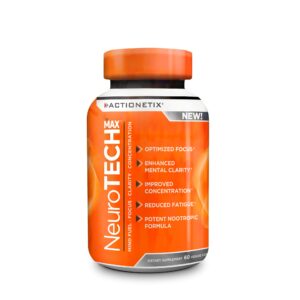


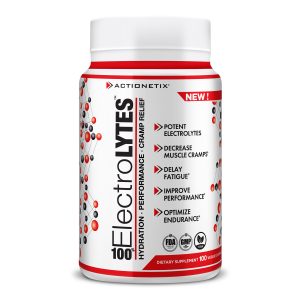
Reviews
There are no reviews yet.